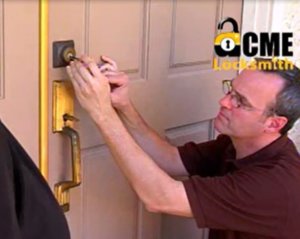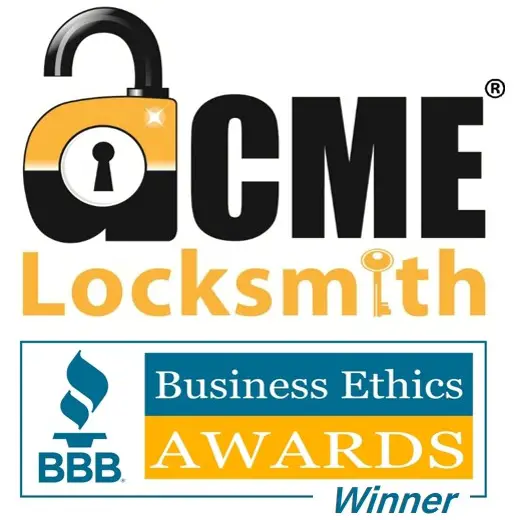Last Updated on January 2, 2025

Notify tenant in writing | File an Eviction Complaint Notice and Summons | Serve an Eviction Information Sheet | Get a Writ of Restitution | Serve the Tenant | Rekey the Property
For the eviction process in Arizona, there are a set of procedures that must be followed to legally evict someone from your property. Once they are out, you want to take steps to ensure that they do not reenter it.
A Locksmith serving the Phoenix Metro area can provide an important service after an eviction to re-secure your property by rekeying the locks so the old tenants can no longer gain access.
The information below is a summary guide on the Arizona eviction process. It is not a substitute for legal advice. This information was obtained by visiting AzCourts.Gov, where you can find more extensive information on the subject.
The Six Steps Needed in the Arizona Eviction Process
Summary
- Notify the tenant in writing that the rental agreement will terminate.
- File an Eviction Complaint Notice and Summons.
- For Arizona residential evictions, also serve an Eviction Information Sheet.
- After winning the judgment, if the tenant does not move out, get a Writ of Restitution.
- Have the Writ of Restitution served by a constable or sheriff.
- Hire a locksmith for an eviction lockout: The cost of an eviction lockout.
Once the Writ of Restitution is served by a constable or sheriff, your tenant no longer has any rights to be in the property. This is when you rekey the property using a local locksmith and protect youself from a tenant re-entering.
The constable or sheriff will provide you with a time when they will serve the writ. You provide this time to the locksmith so that they can meet them at the property location.
All legitimate locksmiths in Arizona will require that the constable or sheriff be present before starting the rekey of the property.

1. Notify the Tenant in Writing that the Rental Agreement Will Terminate
To give you an idea of the flow of the process of evicting a tenant, we’ll look at just one example–that of non-payment of rent. The processes, timing, and necessary forms for different eviction reasons vary, however, so this is just a ‘template’ to the process.
In the case that rent is not paid, the landlord or property manager (you) must give written notice to the resident or tenant.
The notice will state that the rental agreement will terminate if rent is not paid in 5 days (this timing is regulated by the Arizona Revised Statutes section 33, which governs the processes related to tenancy in Arizona.)
You cannot file for an eviction action until one day AFTER the final day of the above notice.
2. File an Eviction Complaint Notice and Summons
File, then serve an Eviction Complaint Notice and Summons to appear in court.
In the case of non-payment of rent, with this notice, you must also provide a record of any rent payments received in the six months prior, and this notice (in general) must be served by a constable, sheriff, or process server in person or, alternately, posted prominently on the property and then also mailed to the tenant by certified mail.
3. Serve an Eviction Information Sheet
For residential evictions in Arizona, you must also serve an Eviction Information Sheet. This does not seem to be required for business or commercial property evictions.
4. Go to Court
The tenant, in return, has the opportunity to respond and present any defenses they have, either in writing or in person to the court.
They are given the opportunity to remedy the situation by paying the past due rent, attorney fees, and court costs before a judgment is entered. There are a few defenses a tenant may be able to show that could prevent an eviction from going through.
The tenant has a right to a trial if the court finds that the tenant MAY have a defense or valid counterclaim. Evidence and testimony are given, and either a judge or (if requested by the tenant at the first appearance before a judge) a jury.
And then a verdict is made.
A default judgment may be entered against the tenant if they do not appear before the judge when the case is called. If they do appear, but lose the case, the judge will usually award the landlord possession of the property, plus rent, fees, and/or other damages if there is a basis to reward them.
At that point, the tenant can no longer stay at that property unless an agreement with the landlord can be worked out. If this is done, it should be in writing.
A judgment, though, does not allow the landlord to take possession. He or she cannot, at this time, do anything to the property, including (by state law) forcibly removing the tenant.
5. Serve a Writ of Restitution
When the tenant does not voluntarily move out, a writ of restitution needs to be filed with the court 5 days after the judgment but can be as few as one day in certain situations where the tenant is acting unlawfully.
Writs of restitution are served by a constable or sheriff (state law mandates this). Until this happens, a landlord or property manager cannot legally change the locks to the property. Once it has been executed, though, they are free to do so.
6. Have the Property Rekeyed when the Writ is Served
Here’s where locksmiths come in. Locksmiths perform an eviction lockout service at the time the writ is served.
Components of an Eviction Lockout
- Service call – the cost to get the locksmith and equipment to the property location.
- Meet fee – the cost to hold the locksmith for your service so they can meet your constable or sheriff at a given time. The locksmith will not be able to service other calls just prior to meeting your constable on location. So, they will not be earning revenue while they wait. They are, in essence, on hold for you. This charge helps the locksmith minimize that lost revenue.
- Gain Access Fee – If the property is locked the locksmith will need to gain access to the property usually by picking the door locks.
- The cost to perform the rekey service.
The cost of an Eviction Lockout
Owners will pay more for a locksmith eviction lockout (or rekey service) because the locksmith will meet the constable or sheriff at a set time. Therefore the locksmith cannot schedule calls immediately before the eviction. This is often referred to as an exact meet fee and can add around $50 to the rekey service cost. If the locksmith must wait on site before beginning the rekey service, they will often bill for that time as well. For a typical 3-door eviction rekey the total cost should be between $250 and $300.
For detailed information on the cost of a locksmith, see our article.
The law prohibits the ex-tenant from remaining or returning to the property without the express permission of the owner (or they can be charged with criminal trespassing), but you will want the extra piece of mind by having the property rekeyed by a locksmith.
Personal property left behind also needs to be disposed of properly, and there are rules that govern this and provide the tenant an opportunity to recover some of their belongings
How Long Does an Eviction Take in Arizona?
While the whole eviction process can be as little as 2 weeks, it’s much more typical that the process will take over a month before the tenant is evicted, and it can be quite costly when court and attorney fees are considered. This is why so many lessors of property do such extensive background checks, to hopefully not find themselves with a tenant that causes them the grief of having to evict.
![]()
More of Our Favorite Security Products
See our Amazon Store for Videos and Links to All of Our Favorite Security Products.
Door Armor: Reinforce your doors. This video on YouTube shows the installation of Door Armor, and you can buy this or similar products from Amazon at a great price.
Video Doorbells: This video doorbell offers great images and video and has NO monthly video storage fees. Watch our SkyBell Video Doorbell Review on YouTube and buy it on Amazon.
Smart Locks: Access Your Locks via Smart Phone. You’ll find some of our favorite smart locks that allow you to control home access and monitor entry in our Amazon Smart Lock Shop. Watch our Smart Lock Comparison Video on YouTube for reviews of the most popular Smart Locks.
High-Security Safes: When you want a safe that is designed to protect the valuables you put inside, you want a high-security safe found on ACME Locksmith’s Safes for Sale website.
Sliding Glass Door Lock: The best Arcadia door lock that stops your sliding glass door from being lifted out of its tracks and prevents little ones from opening the door and leaving the home. Check out the video on YouTube and Buy it on our website.

Leave a Reply